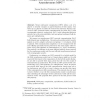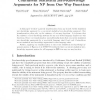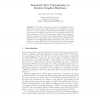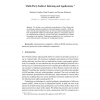118
Voted
ASIACRYPT
2007
Springer
15 years 6 months ago
2007
Springer
Secure multi-party computation (MPC) allows a set of n players to securely compute an agreed function of their inputs, even when up to t players are under the control of an adversa...
ASIACRYPT
2007
Springer
15 years 6 months ago
2007
Springer
Abstract. Tweakable blockciphers, first formalized by Liskov, Rivest, and Wagner [13], are blockciphers with an additional input, the tweak, which allows for variability. An open p...
ASIACRYPT
2007
Springer
15 years 6 months ago
2007
Springer
We describe how we reached a new factoring milestone by completing the first special number field sieve factorization of a number having more than 1024 bits, namely the Mersenne nu...
140
click to vote
ASIACRYPT
2007
Springer
15 years 6 months ago
2007
Springer
In an effort to design a MAC scheme that is built using block cipher components and runs faster than the modes of operation for message authentication, Daemen and Rijmen have propo...
ASIACRYPT
2007
Springer
15 years 6 months ago
2007
Springer
A shuffle is a permutation and re-encryption of a set of ciphertexts. Shuffles are for instance used in mix-nets for anonymous broadcast and voting. One way to make a shuffle verif...
ASIACRYPT
2007
Springer
15 years 8 months ago
2007
Springer
In this paper we show a general transformation from any honest verifier statistical zero-knowledge argument to a concurrent statistical zero-knowledge argument. Our transformatio...
ASIACRYPT
2007
Springer
15 years 8 months ago
2007
Springer
Abstract. GPUs offer a tremendous amount of computational bandwidth that was until now largely unusable for cryptographic computations due to a lack of integer arithmetic and user...
107
click to vote
ASIACRYPT
2007
Springer
15 years 8 months ago
2007
Springer
Abstract. Whereas encryption schemes withstanding passive chosenplaintext attacks (CPA) can be constructed based on a variety of computational assumptions, only a few assumptions a...
115
click to vote
ASIACRYPT
2007
Springer
15 years 8 months ago
2007
Springer
Abstract. We develop a new multi-party generalization of Naor-Nissim indirect indexing, making it possible for many participants to simulate a RAM machine with only poly-logarithmi...
ASIACRYPT
2007
Springer
15 years 8 months ago
2007
Springer




